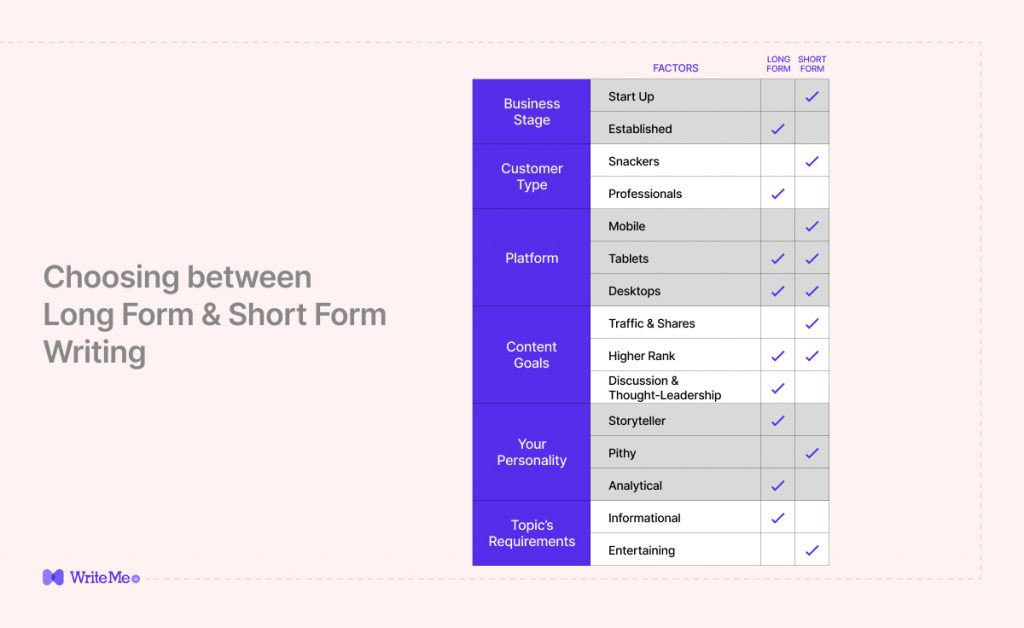What should be the ideal length for your content? Should you write long form content vs short form content? These questions are perhaps the most concerning questions for any content marketer. There is no one size fits all approach for deciding the length of your content. According to one SEMRush report, the long form content is above 1,200 words. However, HubSpot has set a mark of 1000 words or above for long form content writing. [1]
Let’s find out the difference between long form vs short for writing:
Does the Length of Your Content Matter?
Perhaps, this is the most frequently asked question among SEO content marketers. Since length of content is directly linked to decision making regarding long form vs short form content usage, it is imperative to know whether content length matters.
Yes, the length of content matters. However, length of content should not be the only parameter of success for SEO marketing. Similarly, it does not mean that longer content is better content.
Your content length should serve the purpose of writing and convey the right message to the right people. Moreover, it shall meet the objectives of your content marketing strategy. Choosing the right format for your content depends upon the purpose of content writing as well as the user search intent.
Simply put, you need to create content that best answers the user search query. It should deliver the most value to your readers.
To make this process simpler, you can use Random Question generator to brainstorm all the questions your audience may have in mind.
Although the most common goal of content is to rank organically, content serves other purposes as well. Along with organic search growth, content should also engage and onboard your readers. Keep in mind that while long blogs help your readers, social media is imperative to brand growth and sustainable success.
Long Form Vs Short Form Content – Which One to Use?

It depends on your content strategy. A good content strategy has a balanced mix of short form and long form content. Content marketing is all about utilizing available resources and marketing channels to convey your brand’s message conveniently.
If your goal is to improve your search engine rankings as an authority brand, long form content is your friend. But, in situations where minimalist marketing messages are more effective, consider newsletter, it is better to use short form content.
However, in either case it all boils down to your content marketing strategy goals. Long form content brings credibility to your brand. On the other hand, short form content enhances brand message consistency and ensures mobile-optimized user experience.
So, in order to better understand your long form vs short form content needs, consider the following questions before making your decision:
What is the Goal of Content Writing?
Content conveys your story and brand message. Before starting writing, consider the intent and goal of your content. What do you want your writing to achieve ultimately? Should the content engage your audience or offer them helpful advice? Do you want the content to offer actionable tips for your audience or tell how to make the most of your brand? A long form content piece offers thought-leadership which is ideal when you want to become the subject-matter expert in your industry. Similarly, for creating snappy social media posts or launching new products, short, succinct content is a good way to go forward.
Tip: If you do not have a brand story, use AI Story Generator to explore new brand story ideas.
What content will set me apart from other competitors?
Consider what your competitors are doing in terms of content creation. Analyze the topics they are covering, which keywords they use and how much traffic they receive from their content. After this step, carefully review your competitors’ content and find out gaps which you can target through your content. Your content research skills will come in handy. Conduct a thorough content topic research on Google and find out your competitors for specific keywords. Determine how you can better than your competitors and select a word length accordingly.
How Will This Content Help My Audience?
Consider your audience’s intent and how your content will meet their needs. Understanding your audience’s likes, dislikes and preferences will help you gauge the direction of your content creation efforts. Consider what type of content they want to read? What helpful information will they get after reading your content? How long is their attention span? What type of content does your audience read frequently? If your audience is looking for expert advice on a unique subject-matter, your brand should offer them extensive, valuable information. While short form content will engage the audience with your brand, long form content will help you bring more value to your readers.
Summing it Up
In the world of content marketing, size matters. However, it does not come down to the factors that you may think are important. In fact, it all comes down to your content goals, audience intent and beating the competition.
Instead of getting caught up in the word count and character limit, your focus shall be on delivering value to your audience. Ultimately, it’s the value of content that matters the most.
Reference:
[1] Short Form Vs Long Form – SEMrush



